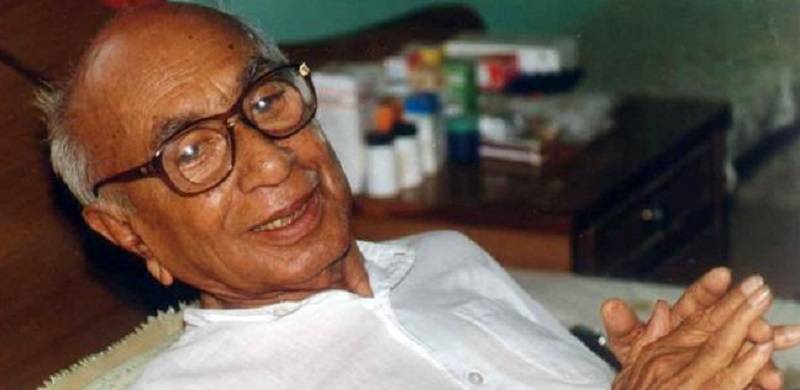
No discussion on the 18th constitutional amendment can ever be complete without examining the tortured history of federalism in Pakistan. And no story of federalism can be told if we ignore how the post-1947 state denied a rightful share of legitimacy to ethno-linguistic nationalisms within the country. In short, this discussion inevitably takes us to G. M. Syed, whose death anniversary was marked by his political disciples and others across the country today. And yet the consumer of Pakistani media could easily go through the day without hearing any reference to this epoch-defining leader: for he does not fit in with the official narrative.
The failure of official Pakistaniat to find room for G. M. Syed's legacy is particularly self-defeating – perhaps even more than the state's inability to deal with Bacha Khan, that other giant of our 20th-century history. In the official narrative, Bacha Khan is easier to unfairly marginalize and misrepresent because he came from a political tradition entirely outside – and often at loggerheads with the All India Muslim League. But G. M. Syed was a man of the Muslim League itself: until, of course, he could no longer reconcile it with his understanding of the interests of the people of the land where he was born.
All the while, his politics was grounded in a deep love of his people – a desire for social justice as well as an interest in their rich traditional spirituality and pluralism. For his views, he was imprisoned – eventually dying in house arrest.
Reform, democratization and federalism will only find fertile ground here when Pakistan's official narrative somehow finds within itself the generosity of spirit to accept that people like G. M. Syed have existed as a political reality of this land – before 1947 as much as after it. Other visions for the meaning of Pakistan and how its polity should be structured will never go away just because the official imagination desires it. There has to be a process of engagement in good faith – from the level of policy-makers to intellectuals and media.
Eminent scholar Hamza Alavi talks about the denial of these marginalized ethno-linguistic realities as a central axis of Pakistan's post-1947 history. That is made all the more painful because the leaders of the Muslim League up to 1947 made a consistent argument for regional rights and federalism. One has to refer only to Quaid-e-Azam M. A. Jinnah's famed 14 Points to understand this.
What changed overnight, from the 13th to the 14th of August? In the answer to that lies the key to Pakistan's future progress, stability, harmony, unity and even viability as a polity. And if we want that answer, we must begin by understanding the political lessons of G. M. Syed, no less than those of the more celebrated Muslim League stalwarts.
The failure of official Pakistaniat to find room for G. M. Syed's legacy is particularly self-defeating – perhaps even more than the state's inability to deal with Bacha Khan, that other giant of our 20th-century history. In the official narrative, Bacha Khan is easier to unfairly marginalize and misrepresent because he came from a political tradition entirely outside – and often at loggerheads with the All India Muslim League. But G. M. Syed was a man of the Muslim League itself: until, of course, he could no longer reconcile it with his understanding of the interests of the people of the land where he was born.
All the while, his politics was grounded in a deep love of his people – a desire for social justice as well as an interest in their rich traditional spirituality and pluralism. For his views, he was imprisoned – eventually dying in house arrest.
Reform, democratization and federalism will only find fertile ground here when Pakistan's official narrative somehow finds within itself the generosity of spirit to accept that people like G. M. Syed have existed as a political reality of this land – before 1947 as much as after it. Other visions for the meaning of Pakistan and how its polity should be structured will never go away just because the official imagination desires it. There has to be a process of engagement in good faith – from the level of policy-makers to intellectuals and media.
Eminent scholar Hamza Alavi talks about the denial of these marginalized ethno-linguistic realities as a central axis of Pakistan's post-1947 history. That is made all the more painful because the leaders of the Muslim League up to 1947 made a consistent argument for regional rights and federalism. One has to refer only to Quaid-e-Azam M. A. Jinnah's famed 14 Points to understand this.
What changed overnight, from the 13th to the 14th of August? In the answer to that lies the key to Pakistan's future progress, stability, harmony, unity and even viability as a polity. And if we want that answer, we must begin by understanding the political lessons of G. M. Syed, no less than those of the more celebrated Muslim League stalwarts.
